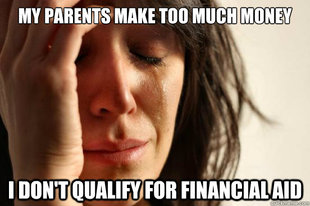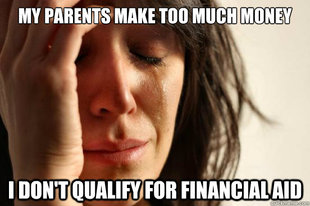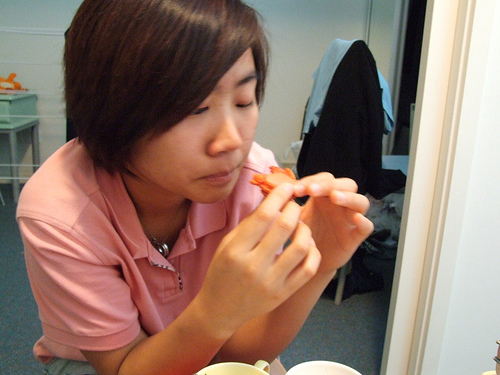 I’ve been rather amused lately by the First World Problems Internet meme. They are complaints only people of privileged circumstances experience. Urban Dictionary says they are “problems from living in a wealthy, industrialized nation that third worlders would probably roll their eyes at.” Examples:
I’ve been rather amused lately by the First World Problems Internet meme. They are complaints only people of privileged circumstances experience. Urban Dictionary says they are “problems from living in a wealthy, industrialized nation that third worlders would probably roll their eyes at.” Examples:
- “Someone was using my favorite treadmill at the gym this morning so I had to angle my head ten degrees to watch the TV.” :'(
- “I’m so full from this all-you-can-eat buffet that I can’t even eat this fortune cookie.” :'(
- “Every time I use my $400 smart phone as an actual phone the touchscreen gets all oily.” :'(
- “I asked for a Coke and all they had was Pepsi.” :'(
- “The shower gets cold after 30 minutes.” :'(
We find these funny because they’re things we can all relate to and because we realise how trivial they are as complaints. The United Nations World Food Programme states that there are 925 million who do not have enough food to eat. Five million children under five die each year because of malnutrition. According to the World Bank, half the world population lives on less than $2.50 per day. What is wrong with us?
Our real first world problem is that as a privileged nation we are complacent and smug. Nothing can touch us. We see this frequently with wealthy politicians who show little concern for the poor. And why should they? They live comfortably and securely with little worries about where their next meal is coming from. But it’s not just the wealthy public figures who have this real first world problem. It’s us too, the 99%, the upper-middle class, the middle class, even the unemployed. All of us who live in wealthy countries find ourselves making first world problem complaints. Once when I worked at a food pantry and charity centre a homeless man was complaining about the colour of a hat and gloves I gave him (they weren’t pink either). Have you ever seen the clothing of people in true poverty in developing countries? If they even have clothes to wear they don’t care what the pattern or design is. They’re likely grateful to God for having clothing.
I was hungry and you fed me, thirsty and you gave me a drink; I was a stranger and you received me in your homes, naked and you clothed me; I was sick and you took care of me, in prison and you visited me. (Matthew 25:35-36)
A Vow of Poverty
We need to put things in perspective. Those in religious life (like the Jesuits) take a vow of poverty. They also fall into the trap of trivial frustrations. (“There’s no more Coke Zero and now I have to drink Diet Coke.”) But what the vow of poverty is, is a kind of living that removes the focus from ourselves and maintains an awareness of how I use the things while being mindful of true poverty.
In a religious community things are shared in common. Money is pooled and shared according to need. Cars are shared and sometimes all the cars are signed out! They cook for one another and share cleaning duties. This reminds us that it’s not all about us. Our lives should be directed toward the good of those around us, working together to build a better world. And any little spending money a religious does have should be spent prudently. When I was a Jesuit I thought not just twice but thrice about how I was spending my money. Do I really need a third Starbucks coffee? Must I purchase the more expensive shoes? Could I spare a bit extra for charity?
One does not have to be a religious with a vow of poverty to live this way. All of this can be done by a single person living on one’s own. The way one person lives can affect thousands of others. Living “first world poverty” means that every action taken—each dollar spent, mile driven, thing purchased, decision made—should be made keeping in mind the kind of poverty found in developing countries. The truth is, as westerners in an industrialised nation, it’s nearly impossible to live the kind of poverty found in Jamaica or Africa. But, it can affect the way we live, what we complain about, and how we spend our money. Those in true deprivation have a keen awareness of the gifts they have from God. In the first world, we have such an abundance of gifts that we fail to see our basic necessities (food, water, shelter, relationships) as gifts from God.
Perspective
To close, I give you some perspective from my time in Jamaica in 2010, where I found a real hunger for God amidst poverty. This is an excerpt from my writings:
I was glad to finally be able to see poverty up close, as I had prayed for during the long retreat: makeshift houses with corrugated scrap metal as walls, open sewers, barefoot children, emaciated stray dogs. The unemployment rate is about 85% and those who do work are only just barely working. I asked Peter, the superior, where they find means to get food and clothing. “Good question,” he said. Many may have to steal or sell drugs. There’s no social safety net here so the Church has an important role. Women run things here and they are ones who take the initiative to open roadside stalls or shops in hopes to make some money selling things.
We tagged along with Sr Beverly (who’s been at there a dozen years) on her weekly work of mercy giving fish, rice, and bread to poor old men and women in downtown Kingston. 12 of us piled into a small van (children included). I crouched on my haunches in the very back next to boxes of food and clothes with a couple little girls who asked me where I was from, what my name was, and told me which school they go to. We turned onto a main street and before I knew it Sr Beverly drove up onto a sidewalk and we were being followed by about 50 men and women who soon began to crowd the van. We had to be careful in giving out food one by one otherwise people would be grabbing for whatever they could get. I had the experience of giving out food and clothes at the food pantry in Syracuse, but this was very different. The poverty, desperation, and need is such that the homeless are more aggressive in their acquiring food and clothing. Not everyone got something either. The physical condition of the women and men was much worse as well: missing eyes, skin problems, scars, burns, misshapen feet, complete lack of teeth. Some shoving broke out between two men so Sr Beverly tried to stand between them, which ended the altercation. We piled back into the van and went back to St Anne’s.









Reblogged this on choosesperanza and commented:
An amazing, amazing post by a good friend of mine.